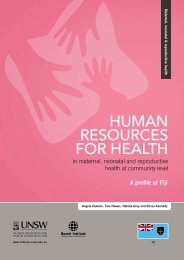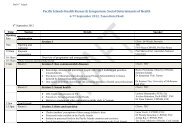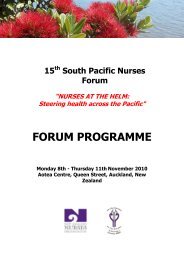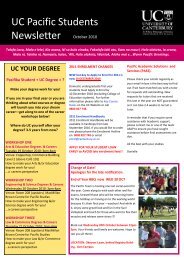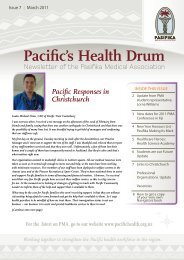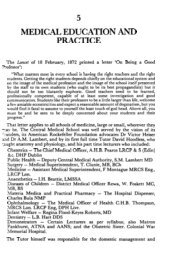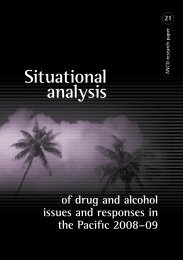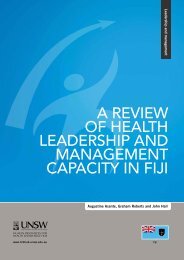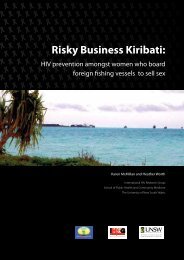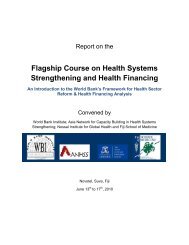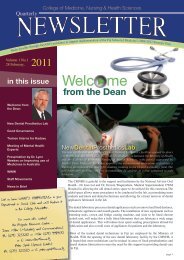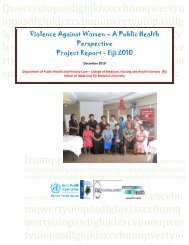rp21 situational analysis - Pacific Health Voices
rp21 situational analysis - Pacific Health Voices
rp21 situational analysis - Pacific Health Voices
Create successful ePaper yourself
Turn your PDF publications into a flip-book with our unique Google optimized e-Paper software.
Fiji. 308 This review included an issues paper<br />
on regional and international obligations in<br />
the context of criminal law and planned to<br />
include narcotics control issues.<br />
Law enforcement<br />
Notably, Fiji is not a member country of the<br />
PICP network. However, Fiji is represented on<br />
PILON. Fiji’s report to the 2008 PILON meeting<br />
focuses on constitutional issues and the<br />
recruitment of additional staff to strengthen<br />
its legal systems and to enable a response to<br />
the backlog and increasing volume of cases<br />
to be heard. 309<br />
<strong>Health</strong><br />
The Fiji Ministry of <strong>Health</strong> has identified<br />
four main risk factors for non-communicable<br />
diseases (NCD): poor nutrition; physical inactivity;<br />
smoking; and alcohol/kava abuse. The<br />
relevant areas include accidents and injuries,<br />
research and surveillance, and monitoring<br />
and evaluation. 310<br />
St Giles Hospital has been the main mental<br />
health service provider in Fiji since 1884.<br />
The service user profile has changed significantly<br />
over time — initially predominantly<br />
‘expatriates’, later Indo-Fijians, and currently<br />
ethnic Fijians. 311 It was reported in<br />
2002 that more than 50 per cent of firsttime<br />
admissions to St Giles included people<br />
with a substance use disorder. 312 The high<br />
level of admissions where the patient had<br />
a substance use issue was explained in part<br />
by what was described as a cultural assumption<br />
that cannabis use induces psychosis. 313<br />
Regulation<br />
Fiji is both an alcohol importer and an alcohol<br />
exporter. In 2003, Fiji exported 661 000<br />
litres (FJ$1.8 million) of liqueurs and spirits,<br />
particularly rum (FJ$1.5 million), beer<br />
(FJ$0.166 million) and wines (FJ$0.11 million).<br />
More importantly, it imported more<br />
alcohol: liqueurs, spirits (FJ$5.2 million); beer<br />
(FJ$0.558 million), 1.8 megalitres ($12 million);<br />
and wines (FJ$5.9 million). At the<br />
time customs tariffs were charged at rates<br />
of FJ$1.55 to FJ$68.66 per litre, or 27 per<br />
cent of total value depending on the type of<br />
beverage and its alcohol content. 314<br />
65<br />
308 Qolilawa Darpan: Newsletter of the Fiji Law Reform Commission, no.14, April 2006: 1–3.<br />
Available at: (accessed June 2009).<br />
309 Fiji Attorney-General, Fiji Report to <strong>Pacific</strong> Islands Law Officers’ Network meeting,<br />
December 2008.<br />
310 Fiji Ministry of <strong>Health</strong>, National Non-Communicable Diseases Strategic Plan 2004–2008.<br />
Available at: (accessed<br />
April 2009).<br />
311 E.S. Puamau (2006), Utilisation review of first admissions in 2002: St Giles Psychiatric Hospital,<br />
Suva, Fiji. <strong>Pacific</strong> <strong>Health</strong> Dialog, 13(2): 79–87.<br />
312 Lewa above, fn.299.<br />
313 Ibid.<br />
314 Provisional import data are collated on a monthly basis throughout the year, available at:<br />



